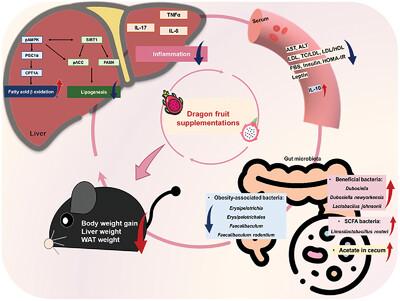Exploring the Effects of Whole Food-Based Dragon Fruit on Metabolic Disorders in High-Fat Diet-Induced Mice
Abstract
Scope
Metabolic syndrome (MetS) significantly contributes to premature mortality, with obesity being a major risk factor. Dragon fruit, cultivated globally, exhibits bioactivity in preventing obesity-related diseases. Traditional studies using organic solvents for extraction do not align with actual consumption patterns.
Method and results
This study evaluates whole red dragon fruit's effectiveness in ameliorating metabolic disorders using a high-fat diet-induced obesity model in mice for 20 weeks. The experimental groups include the supernatant (RS), precipitate (RP), and pomace (PO) of red dragon fruit juice, compared to the supernatant of white dragon fruit juice (WS). The study finds that dragon fruit extracts reduced adipose tissue weight, body fat percentage, pro-inflammatory cytokines, and improved blood lipid profiles. RP is the most effective, reducing body weight by 4.33 g, improving lipid metabolism and glucose homeostasis, and altering gut microbiota to enhance beneficial bacteria and short-chain fatty acids. RP's efficacy in preventing MetS and obesity is attributed to its bioactive components.
Conclusion
These findings advocate for using whole fruits in developing functional products, amplifying the agricultural economic value of red dragon fruit.


 求助内容:
求助内容: 应助结果提醒方式:
应助结果提醒方式:


